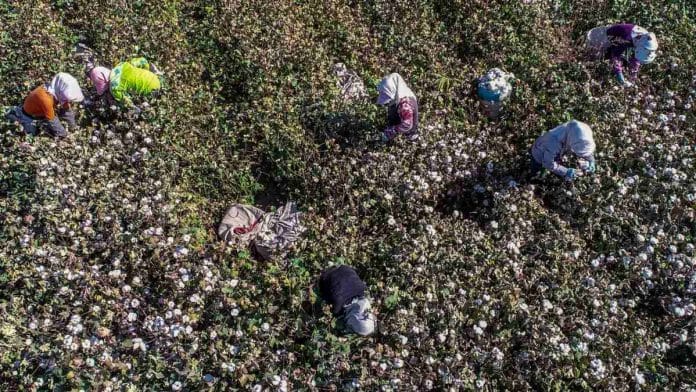Washington: The Trump administration banned cotton imports from a military-linked Chinese firm it accuses of relying on “slave labor,” as the U.S. seeks to ramp up economic pressure on Beijing over its treatment of Muslim ethnic minority groups.
The U.S. Department of Homeland Security said Wednesday that customs officers at American ports would impound “shipments containing cotton and cotton products originating” from the Xinjiang Production and Construction Corps., one of China’s largest producers. The organization — set up by the Communist Party more than 60 years ago to help develop the far western region of Xinjiang — was previously hit by Treasury Department sanctions barring it from transactions with American companies and citizens.
“The human rights abuses taking place at the hand of the Chinese Communist government will not be tolerated by President Trump and the American people,” DHS Acting Deputy Secretary Ken Cuccinelli said in a statement. U.S. businesses shouldn’t be allowed to “profit from slave labor” he said, adding that “‘Made in China’ is not just a country of origin, it is a warning label.”
The Trump administration and other critics of Beijing have targeted cotton from China, which supplies about one-third of U.S. apparel, as a way to increase pressure over the mass detention of Turkic-speaking ethnic Uighurs. Xinjiang produces more than 80% of China’s cotton, much of it from XPCC.
The Trump administration has already sanctioned scores of Chinese companies and Xinjiang party chief Chen Quanguo over their ties to a security state that has detained between tens of thousands and “upwards of 1 million” Uighurs, according to a United Nations’ assessment. China has continued to expand its detention facilities in the region, the Australian Strategic Policy Institute said in September report based on satellite imagery, government documents, media reports and witness accounts.
China defends the camps as “vocational education centers” intended to “purge ideological diseases,” including terrorism and religious extremism. Authorities dispute outside population estimates of the camps, without providing figures of their own. The facilities were built after a spate of deadly attacks involving Uighurs in 2013 and 2014, prompting President Xi Jinping to order authorities to “strike first” against Islamist extremism.
Still, the latest measure stopped short of banning all cotton from Xinjiang, as Cuccinelli told Bloomberg TV in September the U.S. was considering. The decision whether to take further action may be left to the President-elect Joe Biden, who has labeled China’s policies regarding the Uighurs as “genocide” and called for an international effort to make a united stand against the campaign. –Bloomberg
Also read: Shocked, but not surprised — a mantra for the Trump era






